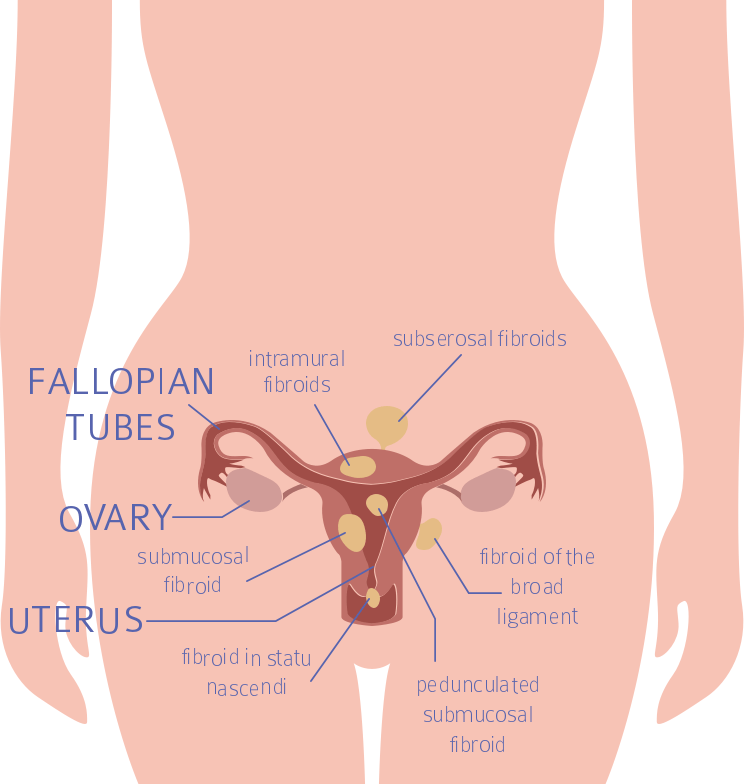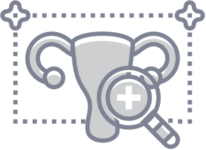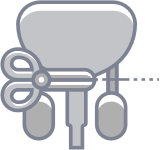Dr Roger Perkins
Gynaecologist Perth
Heavy Periods
- Causes & treatment
- Fibroids treatment
- Endometriosis treatment
- Hysterectomy
Dr Roger Perkins | Perth Gynaecologist
What is period pain? What are heavy periods?
Menstrual loss consists of blood and shed endometrial lining. Up to 35 ml loss lasting for 5 days is usual each period. Anything over 80 ml is considered abnormally heavy.
It is often hard for women to know whether their cycle is abnormal. After all, how do you compare yourself with others? A woman’s menstrual cycle is very individual and private, and so learning what may be different from others can be difficult. It may help to know that each large tampon or pad can hold up to 10 ml when full.
Most women will appreciate that having some degree of period pain and bleeding is normal. However, sometimes when severe, this can be an indication of underlying problems such as endometriosis and fibroids. Certainly, if bleeding is excessive with large clots, and if needing double protection with tampons and pads, or when associated with iron deficiency, this requires specialist gynaecology evaluation. This is also true if the bleeding pattern is not regular, especially if bleeding occurs between periods.
With a thorough evaluation from a gynaecologist, it is possible to rule out important underlying medical conditions.

Dr Roger Perkins | Gynaecologist Perth
What may cause period pain?
Your gynaecologist will assess your medical history and perform routine tests to evaluate the causes of your period pain. Depending on the outcomes, treatment or management may be advised. The common causes of heavy periods include:
- Imbalance in the body’s hormones linked to polycystic ovaries (PCOS)
- Fibroids
- Adenomyosis (where the endometrial glands grow deeper into the muscle of the uterus)
- Endometriosis
- Endometrial polyps
- Blood clotting disorders such as Von Willebrands
Dr Roger Perkins | Gynaecologist Perth
How do we treat period pain?
After evaluation of the underlying cause, the most appropriate treatment is discussed. As your gynaecologist, I take your individual needs into consideration. Treatment may include:
- Medications such as simple analgesia and anti-inflammatory medication
- Medication to reduce blood loss (tranexamic acid tablets)
- The contraceptive pill, intrauterine progesterone releasing IUCD
- Surgical treatment of fibroids, adenomyosis and endometriosis
- Medication to suppress the cycle
Dr Roger Perkins | Fibroids specialist Perth
Fibroids treatment
Fibroids are relatively common benign growths within the muscle layer of the uterus.
They can be associated with heavy periods and infertility. The size of the fibroid and their location are important factors. Classification from outside to in:
- Serosal fibroids (towards the outer layer of the uterus). These are often less of a concern because they have less effect on fertility, but may cause problems by pressing on the bladder and being noticeable during physical activities.
- Intramural fibroids (within the wall of the uterus). These may cause heavy bleeding and affect your fertility.
- Mucosal fibroids (impinge on the cavity of the uterus). These can be the most concerning. They may interfere with pregnancy implantation and lead to infertility if not treated.
If you have large fibroids, you may notice them, as they can press on adjacent structures or interfere with urine flow. Sometimes, bladder capacity is reduced by the fibroid, so you find you need to empty the bladder frequently.
Depending on the size and location of the fibroids within the uterus, your specialist will determine the best form of management. This management needs to be individualised by the gynaecologist. Sometimes medication therapy will suffice, and in other situations surgery is needed.

Treatment of fibroids
- If the fibroids are small, they can sometimes be left alone. Regular check-ups by a specialist Gynaecologist is recommended. It may be possible to fit a hormone-releasing IUCD to control your bleeding. Alternatively, heat treatment (endometrial ablation) will be needed. Note that these treatments do not actually remove the fibroids.
- Removal of fibroids needs to be undertaken by a specialist with advanced training. This operation removes the fibroids completely and also allows you to have further pregnancies.
- In some cases a hysterectomy may be required, once you have completed your family. This procedure is undertaken laparoscopically in most cases, and is best carried out by a gynaecologist who has undergone the advanced training needed for this procedure.
I am a skilled specialist in fibroid surgery in Perth and have undertaken the advanced training needed to do these procedures.
Dr Roger Perkins | Endometriosis specialist Perth
Endometriosis treatment
Endometriosis is a common condition causing severe pain and time away from normal activities. It is a painful inflammatory condition affecting the lining tissues of the pelvis. It may also be associated with infertility. Treatments include medications and surgery.
Evaluation by a gynaecologist who is specially trained in endometriosis will be needed to determine the best treatment option in each individual case.
- Endometriosis is evaluated with laparoscopy. At my practice in West Leederville, Perth, I use my experience as a specialist, and advanced training in laparoscopy, in order to help with the diagnosis and management of endometriosis.
- Laparoscopy (keyhole) surgery will determine the severity of endometriosis. During the procedure I will be able to treat the lesions laparoscopically. Early lesions are usually treated with diathermy ablation. Deeper lesions will require excision (removal). Often, endometriosis is associated with adhesions, which can be treated at the same time. Typically laparoscopy is undertaken in day surgery with general anaesthesia.
- Medical therapy. Treatment with simple analgesia and anti-inflammatory medications will be helpful to relieve some of the worst pain. Often this is combined with hormone therapies such as the contraceptive pill, or the progesterone releasing IUCD. Alternatively, medication to suppress the menstrual cycle is very effective in treating pain and inflammation. A common example of this is a GnRH analogue. Note that all hormonal treatments are contraceptive whilst taking them, but are fully reversible and allow return of fertility after stopping.
Dr Roger Perkins | Gynaecologist Perth
Hysterectomy
This procedure removes the uterus. Depending on the woman’s background history and individual requirements, it is usual for the ovaries to be preserved. It is current best practice to remove the Fallopian tubes at the time of hysterectomy, in order to reduce the risk of malignancy.
Hysterectomy is undertaken under general anaesthesia. It usually requires 2 nights in hospital followed by several weeks off work. It is recommended when women have completed their family and are complaining of severe heavy periods, endometriosis and fibroids. It is performed by a specialist gynaecologist, trained in advanced laparoscopy techniques. I have received the training needed to perform laparoscopic hysterectomy, and offer this service at my practice in Perth.
More about Dr Roger Perkins

Colposcopy

About Dr Roger Perkins
"My aim is to make you feel comfortable at all times. My consultation style is unrushed and I respect your schedule by minimising waiting times. You are a unique person and I make it my goal to truly get to know you."
